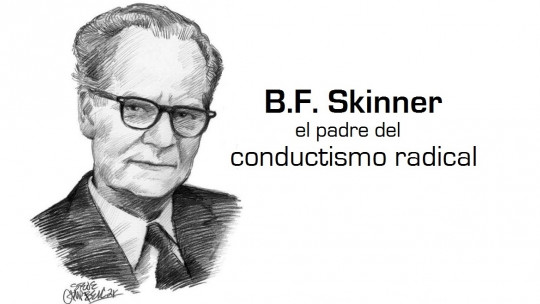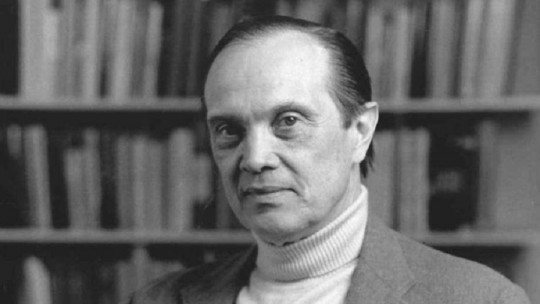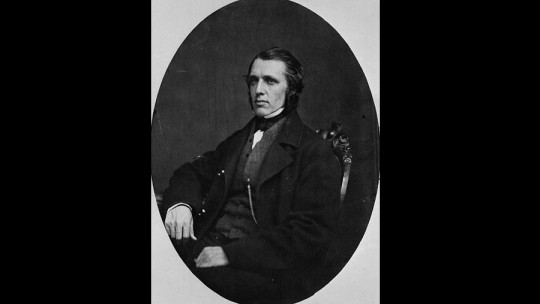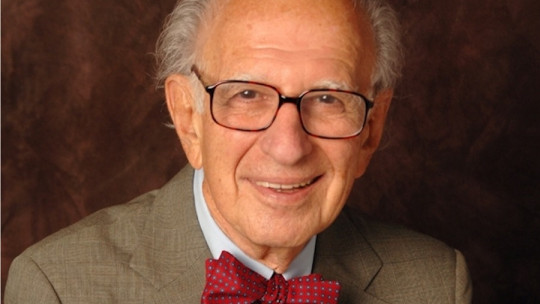What we understand by Psychology It can be very broad. It is a field of study and intervention in which a large number of theoretical and practical proposals are included regarding issues that are not so similar to each other, and which has historically given birth to a large number of theories and proposals about human behavior
B.F. Skinner Biography
However, not all of these currents of Psychology have been assigned to the scientific method with the same force: some seem to be essentially related to philosophy, while others only conceive the study of psychological processes as something approachable from the science
This second tradition of Psychology owes much of its existence to a researcher called Burrhus Frederic Skinner Manager revolutionize human action research through his radical behaviorism
The beginning of his career
BF Skinner was born in March 1904 in a small town in Pennsylvania, United States. Encouraged by the creative possibilities of prose, during his youth He set out to create a career as a writer , but he gave up his intentions when he realized that he did not have the facility to do so. He decided, however, that the studies of Psychology could provide him with a broader perspective on what human beings are like and how they act, which is why he began to study this discipline at Harvard.
This renewed enthusiasm did not last long. Upon arriving at the university, he found an underdeveloped psychology that was very focused on private mental processes, some disconnected ideas about the human mind, and very abstract theories about states of consciousness that were more related to philosophy than to the scientific study of the human mind. behavior.
Towards a scientific psychology: the influence of John Watson
Because it was observable human behavior that BF Skinner aspired to understand. Influenced by the behavioral psychologist John B. Watson , believed in the importance of developing experimental psychology and leaving behind psychoanalysis and theories about the mind based on simple common sense. However, the use of the scientific method was not common in the psychology studies taught at Harvard.
If he did not give up on his academic and professional career, it was thanks to Fred S. Keller, who in the late 1920s was one of the young promises of behaviorism at Harvard. Fred Keller convinced Skinner that it was possible to make psychology a science , and shortly after both received doctorates in that discipline. That small meeting, in addition to consolidating a friendship between the two Freds that would last decades, made it possible for Frederic Skinner to become one of the most important figures in Scientific Psychology.
Psychology according to BF Skinner
Skinner developed his studies within the methods and philosophy of behaviorism, a tradition of young Psychology at that time that rejected introspective methods as a way of studying and modifying the mind. This same concept, that of “the mind”, seemed to Skinner to be something too confusing and abstract to be taken into account, and it is That is why he placed his object of study in pure observable behavior
Maintaining this purely empirical evidence This is what meant that neither the methods nor the object of study of the psychology that this researcher studied were the same as those used by psychoanalysts, focused on introspection and whose approach to the study of the psyche does not resist the Popperian principle of falsifiability.
In the rivalry established between mentalistic psychology and behaviorism, BF Skinner strongly opted for the second option in pursuit of making psychology a behavioral science.
The birth of Radical Behaviorism
Skinner did not want psychology to fully embrace the scientific method simply so that his field of study would be better regarded by having the endorsement of science. This researcher He sincerely believed that internal mental processes are not responsible for originating human behavior, but external and measurable factors
BF Skinner believed, in short, that the proposals and hypotheses of psychology should be tested exclusively through objective evidence , and not through abstract speculation. This theoretical principle was shared by behavioral psychologists in general, but BF Skinner differed from most of them in a fundamental aspect.
While certain researchers who at the beginning of the 20th century were attached to the current of behaviorism took behavior as an indicator of methodological objectivity to create explanatory models of human psychology that included some non-physical variables, Skinner believed that behavior itself was in itself the beginning and the end of what must be studied in psychology. Thus, rejected the inclusion of non-physical variables in research of what psychology should be for him.
The term “radical behaviorism,” coined by Skinner himself, served to name this type of philosophy of behavioral science In opposition to methodological behaviorismhe radical behaviorism takes the principles of the behaviorism that had already been developed by researchers such as John B. Watson or Edward Thorndike. That is why, according to this philosophical position, concepts that refer to private mental processes (as opposed to observable behavior) are useless in the field of psychology, although their existence is not denied.
Skinner and operant conditioning
BF Skinner is, of course, one of the greatest references of behaviorism, but he was not a pioneer of this psychological approach. Before him, Ivan Pavlov and John B. Watson had described the foundations of classical conditioning in animals and humans respectively. This is important, since initially behaviorism was based on learning by association of stimuli as a method to modify behavior, and classical conditioning allowed relationships to be established between stimuli and responses so that behavior could be predicted and controlled.
For Skinner, however, Classical conditioning was not very representative of the human being’s own learning potential since it could practically only exist in very controlled and artificial environments in which conditioned stimuli could be introduced.
The importance of operant behavior
Contrary to what other behaviorists thought, Burrhus believed that operant behavior, and not responding behavior, is the most common, universal, and versatile kind of behavior which means that when modulating behavior, the consequences matter more than the stimuli that precede it.
It is the results of the actions that are fundamental, says Skinner, since it is from these that the true usefulness or otherwise of the actions is revealed. A behavior about the environment is considered operant because it has a series of verifiable consequences and it is these responses from the environment (also including other living beings in this category) that alter the frequency with which that behavior or a similar one is reproduced again.
Thus, BF Skinner basically uses the form of associative learning known as operant conditioningbased on the increase or decrease of certain behaviors depending on whether their consequences are positive or negative, such as giving incentives to children when they do their tasks.
Skinner boxes
Skinner experimented with animal behavior based on the principles of operant conditioning. To do this, he used environments in which he attempted to have total control of all the variables to be able to clearly observe what affected the animal’s behavior.
One such artificial environment was the so-called “Skinner box”, a kind of rat cage that had a lever and a food dispenser Every time the rat, by chance or deliberately, activated the lever, a piece of food fell next to it, which was a way of encouraging the rodent to repeat that act. Furthermore, the frequency with which the rat moved the lever was automatically recorded, which made it easier to perform a statistical analysis of the data obtained.
The Skinner box served as a means to introduce various variables (including electric shocks) and see how they affected the frequency with which certain behaviors occurred. These experiments They served to describe certain behavioral patterns based on operant conditioning and test the possibility of predicting and controlling certain actions of animals Today, many spaces used for animal experiments are called Skinner boxes.
Burrhus Frederic Skinner, the great debater
One of the consequences of professing radical behaviorism is having to deny the existence of free will In the book Beyond freedom and dignity, Skinner clearly expressed in writing this logical consequence of the philosophical principles on which he was based: if it is the environment and the consequences of actions that shape behavior, the human being cannot be free. At least, if by freedom we mean indetermination, that is, the ability to act independently of what is happening around us. Freedom is, therefore, nothing more than an illusion far removed from reality, in which each act is caused by triggers beyond the will of an agent who decides.
Of course, Skinner believed that human beings have the ability to modify their environment to make it determine them in the desired way. This perspective is nothing more than the other side of the coin of determination: the environment is always affecting our behaviors, but at the same time everything we do also transforms the environment. Therefore, we can make this loop of causes and effects take on dynamics that benefit us, giving us more possibilities for action and, at the same time, greater well-being.
His denial of free will brought him harsh criticism
This philosophical position, which today is relatively normal in the scientific community, sat very badly in an American society in which the principles and values of liberalism were (and are) strongly rooted
But this was not the only point of friction between BF Skinner and public opinion. This researcher dedicated much of his time to inventing all kinds of gadgets based on the use of operant conditioning and he liked to appear in the major media to show his results or proposals. In one of his coups, for example, Skinner even trained two pigeons to play ping-pong and even proposed a system to guide bombs using pigeons that pecked at the moving target that appeared on a screen.
Public opinion labeled Skinner an eccentric scientist.
This kind of thing made BF Skinner gain an image of eccentric character , which was not surprising taking into account the extreme approaches and far from common sense of the time that germinated in his conception of what radical behaviorism is. It also didn’t help that he invented a kind of crib with adjustable temperature and humidity, which was accompanied by the myth that Skinner was experimenting on his own daughter who was just a few months old.
For the rest, his opinions on politics and society expressed in his book Walden Two They did not match the dominant ideology either, although it is true that Skinner did not miss any opportunity to appear in the media to explain and qualify his proposals and ideas.
The legacy of B.F. Skinner
Skinner died from leukemia in August 1990, and He was working until the same week of his death
The legacy he left behind served to consolidate Psychology as a scientific discipline and also revealed information about certain association-based learning processes.
Beyond Skinner’s media role, it is unquestionable that he became a scientist who took his work very seriously and dedicated a lot of time and thoroughness to generating knowledge backed by empirical verification. The importance of his legacy has survived the behaviorism of his time and has gone on to strongly influence Cognitive Psychology and the emergence of Cognitive-Behavioral Therapies.
Therefore, it is not surprising that today, 25 years after his death, BF Skinner is one of the most vindicated figures in Scientific Psychology









